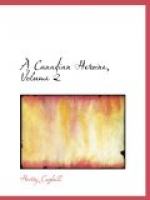A light waggon came winding in and out with the turnings of the road—now crossing a wooden bridge, now passing through the shadows of a dozen or more oaks which grew close together. Sometimes, when the ground was clear, the waggon went straight through one of these groups. Sometimes it turned aside, to avoid the thick brushwood underneath. The “waggon,” which was neither more nor less than a large tray placed upon four wheels, and having a seat for two people, was occupied by two young men, Harry Scott and George Anderson. They were coming down from their homes, two farms which lay close together some little distance up the lake, and were going first to the sawmill and then to the town. But they were in no particular hurry, and the afternoon was pleasant, so they let their horse take his own time, and came jogging over the sand at a most leisurely pace.
They had passed that very piece of land which had given Dr. Morton so much trouble lately; it was natural enough, therefore, that their chat should turn to speculations as to his success in ejecting Clarkson from his house, and the Indians from their fisheries.
“More trouble than it’s worth,” said George Anderson; “there is not a tree on the land that will pay for cutting down.”
“Very likely not; but the land may not be bad; and it is a capital situation. I only wish it were mine,” answered Harry, who had his own reasons for wishing to be a little more independent in circumstances.
“Tell you what,” said George, making a knot on the end of his whip-lash, “my belief is, that it is quite as much for pleasure as profit that the Doctor is so busy about his land.”
“Pleasure?”
“Yes. Do not you see any pleasure in it? By Jove, I asked him something about Clarkson the other day; and if you’d seen his face, you’d believe he enjoyed the fight.”
“Well, that’s not unlikely. He’s a great brute, that Clarkson. I should not mind pitching into him myself.”
“I should, though,” said George laughing; “the chances of his pitching into me in return would be too strong.”




